You can read Part 1
here.
Shortly before I let the blog go dark, I started a project to watch and review 21 specific episodes of
Star Trek: The Next Generation recommended by
Alan Doane. The idea came about after some twitter chatter between me, Alan, and
Tim O'Neil. When Tim said he'd wanted for a while to write a Top 10 list of his favorite
TNG episodes, I responded that I couldn't even think of 10 that were worth watching. Shortly afterward, Alan posted
a list of 21 episodes of the series he thought were great and enjoyed "watching again and again." I took the list as a challenge. Since all the episodes are available digitally on Netflix, I vowed to watch all 21 and blog about them.
I didn't get very far and upon reflection that shouldn't be surprising. It seems usually, before I decide to fall off the face of the Internet once again, I make big promises about grand projects. Their bigness probably has something to do with my eventual choice to not finish
any of them and hide in a corner for a year.
I doubt Alan, Tim, or anyone else would wag a finger if I chose to just forget about this and move on. After all, it's been nearly a year since I posted
the first segment and that only covered the first four episodes. If this were Peter Jackson's
The Lord of the Rings adaptations or
The Hobbit (which, as I've been writing this, has no doubt been extended from a trilogy to 6 movies, one HBO mini-series, and some youtube shorts featuring Agent Coulson from
Avengers), then a year's break would be expected, but it's kind of weird for something as relatively small in scale as my
TNG reviews to have an annual rotation.
But the thing is, I notice I have these cyclical things. I mentioned, for example, how I always make big promises about big projects before I stop blogging? Well, I want to construct some new cycles, and one of them involves finishing what I started.
So here's Part 2 of my Not-Sure-How-Many-Maybe-Five-But-The-Existence-Of-Two-Part-Episodes-Makes-It-Tricky Part series, "Learning to Love
Star Trek: The Next Generation."
"Yesterday's Enterprise"
Season 3, Episode 15
Directed by David Carson
Moments after the
Enterprise investigates a temporal anomaly, everything changes. One second we're on the bridge with which we're familiar, watching Picard regard the view-screen thoughtfully and concernedly, consulting with Commander Worf. But before the opening credits the bridge becomes much darker, Worf disappears, and in his place stands Lt. Tasha Yar who met her end two years previous in "Skin of Evil." No one seems to notice anything's amiss except for Whoopi Goldberg's occasional character, the oracle/bartender Guinan. Whatever's gone wrong has something to do with the
Enterprise C
- the ship that preceded Picard's command - which emerges from the temporal anomaly battle-scarred, barely operational, and carrying a crew from 22 years in the past. We eventually learn that in the timeline we are witnessing, the Federation is locked in a long war with the Klingons and it is a war they are close to losing.
The
Enterprise C has something to do with it, and Guinan - who feels in her bones the wrongness of the timeline - desperately tries to convince Picard to send the
Enterprise C back through the anomaly to the past, an act which would potentially fix the timeline but almost certainly act as death sentence to the
Enterprise C's crew.
Before starting this project, there was a very short list of
Star Trek: The Next Generation episodes that truly impressed me, and "Yesterday's Enterprise" was one of them. I saw it when it originally aired and it seemed immediately unique and powerful in a way that no episode before it could have been. I'm afraid I'm not educated enough about television to say with complete authority that "Yesterday's Enterprise" was the first alternate reality episode of its type of any series, but it was definitely the first I saw and I loved it. It was copied quite a bit, not only in other
Star Trek series, but all across the spectrum of television. The first example that springs to mind is
Buffy the Vampire Slayer's "Superstar" in which a minor, nerdy character becomes the star of show and even the opening credits of the episode were changed to reflect it.
That is what immediately, viscerally impressed me about "Yesterday's Enterprise"; not just that it temporarily changed the status-quo, but that it did it, initially, without explanation. It just dropped you in the changed world and let you figure it out. Very little is left to the imaginations of impatient television audiences, and it's such a boon when a show's creators are brave enough to trust the audience will stick with them without a spoon-feeding.
There's a lot about "Yesterday's Enterprise" like that; changes that are clear and irrefutable but aren't shoved in your face, that you might not even notice unless (like me) you're sitting there with a pen and a notebook and writing stuff down. The show's crew accomplished quite a bit by simply turning down the lights. The
Enterprise of this episode is a much darker place, and it reflects the dark moods the war with the Klingons have inspired (though, from a practical standpoint, you can't help but wonder why being stuck in a long war would make people want to see stuff less clearly at work). During the first argument between Picard and Guinan, you can see a map outlining Federation and Klingon positions behind Guinan. The Federation uniforms are altered slightly, and eventually you notice that no one goes anywhere on the ship without a phaser handy. One of the things I find the most interesting about the episode is a subtly, but noticeably, different dynamic between Picard and Riker. There is little camaraderie between the two. Picard doesn't waste an extra word or breath for his First Officer, and his usual patience and consideration towards Riker's questioning is replaced with terse rebukes.
The alternate reality aspect of the episode has a way of rendering Yar's presence, and thus her absence and her death, more powerful than it ever was in "Skin of Evil" or any other episode that referenced her passing. It isn't until we're deep in the episode that Guinan gives Yar dark, wary glances as if she's about to drive a stake through Yar's chest. The rest of the time, no one acts like there's anything strange about Yar being alive and well, and that fills Yar's scenes with so much more meaning. In a brief exchange between Data and Yar on the turbo-lift, there is no hint, no tongue-in-cheek reference, regarding their memorable union in "The Naked Now," and of course that makes you think of nothing
but that. Toward the end of the show, when Yar requests to go back in time with the
Enterprise C and Picard vehemently - almost childishly - rails against her request, you get the notion that even though Picard is as firmly ensconced in this Wrong timeline as everyone else, that part of him remembers what happened to Yar across the temporal gulf and desperately wants to hold on to this second chance to save her.
It is not a perfect episode. There are little things that bother me. The sashes most of the crew wear don't really go well with the uniforms and don't seem to have a practical value. Lt. Castillo's courting of Yar just seems kind of silly under the circumstances. And I can't help but wonder if the timeline is different, if the Federation is in a perpetual state of war, and if the very notion of children being on a starship is enough to make Picard look at Guinan like she's grown a third arm, why the hell is Wesley still driving the ship?
Regardless, this is not an episode Alan or anyone else has to convince me is worth watching again and again. I understand it's a favorite of
Trek fans, and with good reason.
"Sarek"
Season 3, Episode 23
Directed by Les Landau
The
Enterprise is tasked with the honor of bringing the Vulcan ambassador Sarek - father to Spock of the original series - to form an alliance with a race known as the Legarans. It soon becomes clear that Sarek is not the vulcan he used to be. He is easily irritable and shocks the crew when, at a Mozart concert performed for his honor, he is so moved by the performance he sheds a single tear. Meanwhile, tempers on the
Enterprise are flaring. Otherwise calm crew members are coming close to blows with one another, and eventually actual violence breaks out barroom-brawl-style on Ten Forward. We soon learn that Sarek is suffering from Bendii Syndrome, a rare vulcan illness that causes Sarek's emotional repression to break down while broadcasting hostile emotions to those around him; a fact that Sarek's wife and assistants have tried desperately to hide from him. Picard tries to cancel Sarek's negotiations with the Legarans when he becomes convinced Sarek cannot possibly go through with his mission. Perrin, Sarek's wife, suggests an alternative. Sarek mind-melds with Picard in order to temporarily transfer his emotional instability to the
Enterprise captain. He conducts the negotiations while Picard struggles to cling to his sanity.
I think it's fair to say that for most of my reviews so far I've been pleasantly surprised with how much I enjoyed the episodes. "Sarek" definitely breaks that streak. Like many of the best
Star Trek episodes, it deals with a very contemporary subject: the potential horrors of aging and how they can affect not only the elderly, but the people in their lives. "Sarek" doesn't work for me however, and some of the reasons why might fairly be laid at the doorstep of personal preference.
Vulcans bother me. Or, to be more precise, the manner in which they are handled bothers me. Vulcans are always vulcans and the most important thing about being vulcan to a vulcan is being a vulcan. They are always reminding you they are vulcan. Judging by how they are handled in every single episode of every
Star Trek series to prominently feature a vulcan, they don't just suffer from Pon-Farr or Bendii; they also suffer from a condition which compels them to say something along the lines of, "perhaps you are forgetting that I am a vulcan" once per episode or their fucking heads explode. Do the rest of us do that? Does a human on an otherwise vulcan ship walk around yelling, "Hey guys, I'm human! Don't mind me sitting over here watching
Jersey Shore and playing with my own poo! I'm human." I honestly do not know if a situation has ever arisen in which I felt the need to remind people of my species, but for vulcans it is apparently an every day thing. Klingons too, now that I think about it. In fact, Klingons need to constantly remind
each other (e.g., "WE! ARE!
KLINGON!" (the preceding quote was taken from every episode of every
Star Trek series to feature two or more klingons)).
It's impossible for that kind of thing to not come up in an episode like this. When Sarek loses his shit while arguing with Picard and starts yelling. "It's ILLOGICAL! ILLOGICAL! ILLOGICAL!" over and over, I kind of throw my arms up and give up on liking the show. It seems like these incredibly intelligent and creative people have somehow found a way to bookend everything they could possibly have to say in the world with reminders to everyone around them that they're vulcan, and proclamations that something is either logical or illogical, and there just isn't one goddamn thing interesting or convincing about that.
Things aren't helped by Mark Lenard's portrayal of Sarek. As long as he just needs to be very ambassadorial and vulcany, he's great. But as soon as he has to convey emotions, I stop buying his performance.
I also can't get beyond the feeling that while on the surface this is a show about the ravages of age, in a much more real way, this is an episode about Spock; more precisely, the relationship between Sarek and Spock. Not directly of course. He's only mentioned twice in the episode, but you feel his presence regardless. The emotional climax of the episode comes when Picard, suffering from Sarek's emotions via the mind-meld, cries out Sarek's love for Spock (sure, he mentions Perrin too but who gives a crap, we barely know her), and even though he's hardly mentioned, it feels like this is the moment the story's been leading up to. And really it feels like the only thing worth caring about.
"The Best of Both Worlds" Parts 1 & 2
Season 3, Episode 26 and Season 4, Episode 1
Directed by Cliff Bole
The Borg finally reach the Alpha Quadrant, and all hell breaks loose. The lone cube heads straight for Earth, kicks the
Enterprise's butt, captures Picard, assimilates him into the collective with the name "Locutus of Borg," and decimates a huge chunk of the Federation fleet. Commander Riker is forced to take the helm and defeat the Borg, even though his old captain's knowledge now informs their strategies.
I think it's fair to say "The Best of Both Worlds" remains one of the most important stories in
Star Trek's continuity. It set the stage for
Star Trek: First Contact and
Star Trek: Deep Space Nine. Perhaps more importantly, at least to this writer, it made good on the promise Picard dreadfully uttered at the end of "Q Who"; the episode that introduced the Borg.
"They will be coming."
I watched "The Best of Both Worlds" when it first aired - both parts - and it occurs to me as I write this that it was one of the first times I remember a television show making good on a promise like that. Sure, two part episodes and the like had been around forever. Recurring villains were nothing new; hell, the original
Enterprise crew had its fair share of them. But while now I appreciate the fact that most TV episodes back then were written specifically so that new viewers would need a minimal amount of back-story for immersion, at the time I resented it. I'd grown up on Marvel comics. I was used to needing Story A to understand Story B, and needing both to understand Story C. I didn't like how every episode, no matter what the series or franchise, seemed to start from zero. I resented any discrepancies; anything forgotten from past shows. The other
Trek spin-offs set in
TNG's era -
Voyager and
Deep Space Nine - would both eventually come to rely on more extended storylines, but in the meantime this was the first time
TNG made me think it might live up to my comic book wishes.
Re-watching it, I'm surprised at how well it stands up to the test of time. It's a relatively fast-paced show with a lot more action than most
TNG episodes, and before the first tussle with the Borg, there's this great sense of overwhelming doom. The Borg are rendered a huge, unmovable enemy unlike any the
Enterprise has encountered. The battles between
Enterprise and the Borg cube are some of the most engaging of the franchise. Even though their first tussle is largely a rip-off of the battle between the
original
Enterprise and the Khan-controlled
Reliant in
Star Trek II, it's a fun and suspenseful (if not overly original or surprising) ride.
One of my favorite parts of re-watching "The Best of Both Worlds" is the focus on Riker. I don't think I ever thought seriously about Riker as a captain. Certainly I never thought the show would end with Picard permanently absorbed by the Borg or dead with Riker needing to take over for good, but as I watched it this time around, I couldn't help but think, "Well, maybe." Patrick Stewart could never be replaced in
TNG, but if Frakes were given his own show, I just might watch it. His Riker enjoys kind of a middle ground between Picard and Kirk. He's too safe and rigid to be Kirk, but too devilishly cunning and ruthless to be Picard.
And now that I've been deservedly positive about this episode, allow me to reproduce a line of dialogue from it for the sake of snark.
"The Borg have neither honor nor courage. That is our greatest advantage."
Worf is such an asshole. Why does he even have a job?
To be continued...
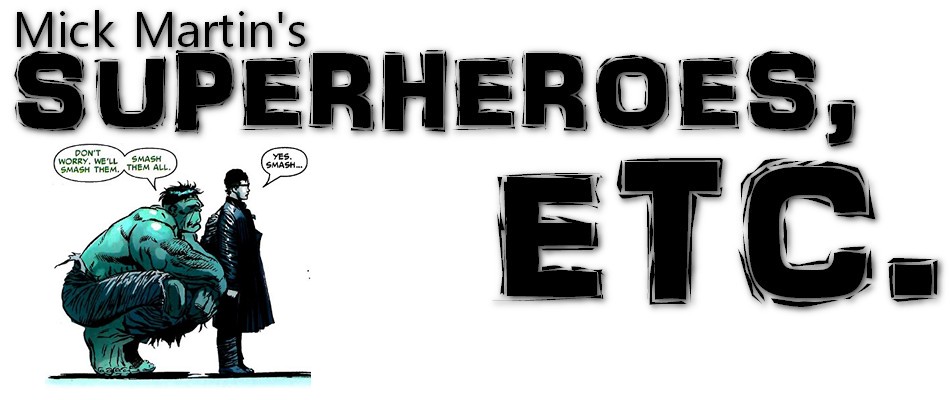

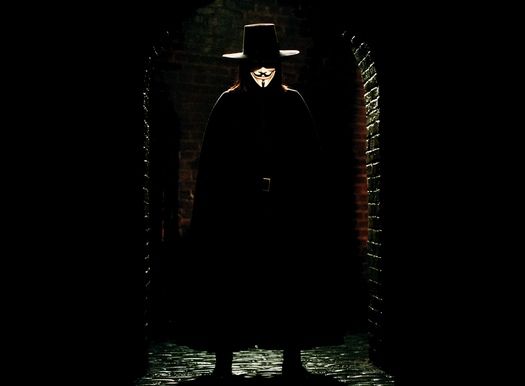
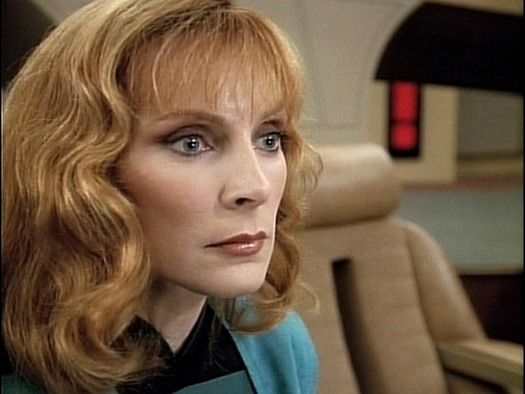
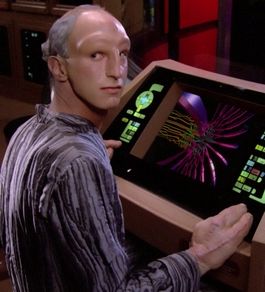
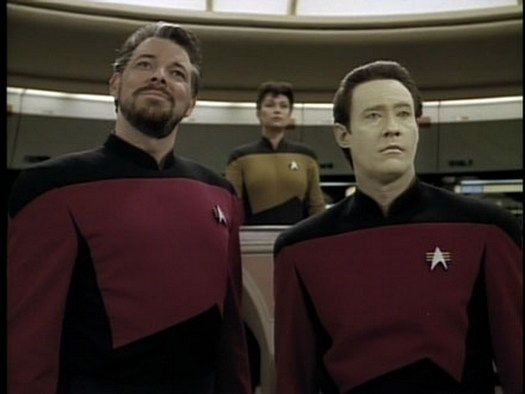
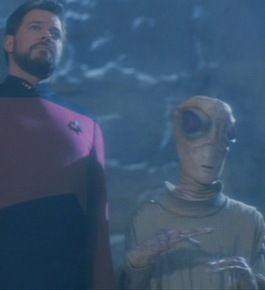
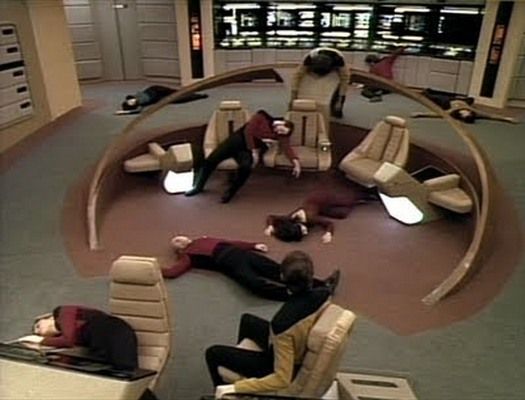

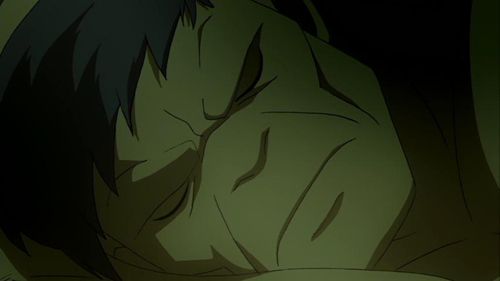


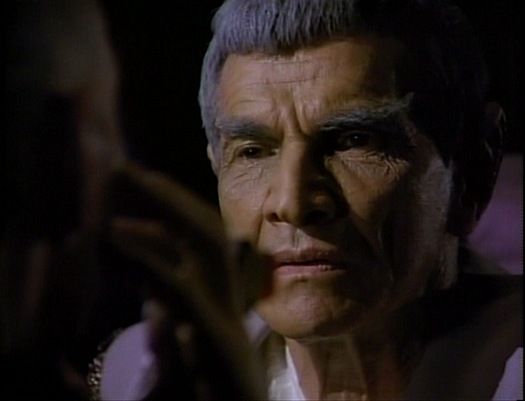


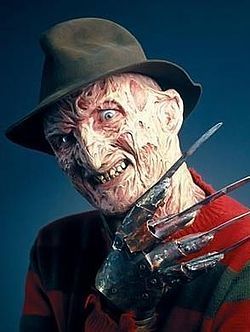
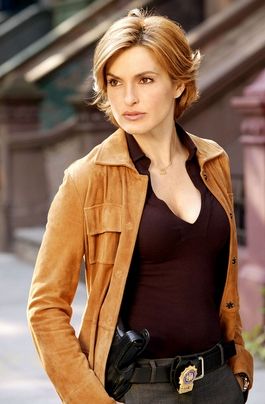
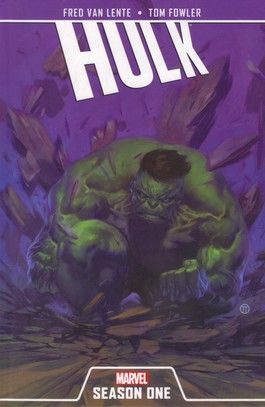
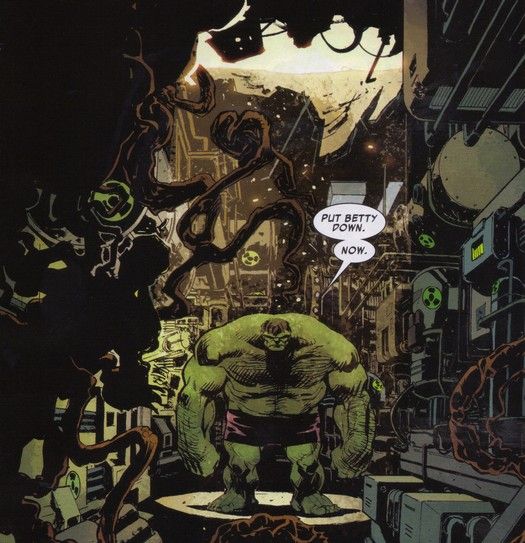
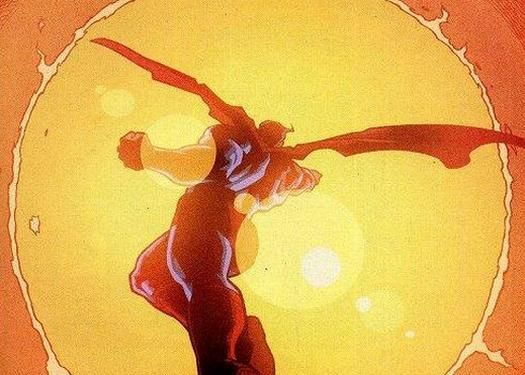
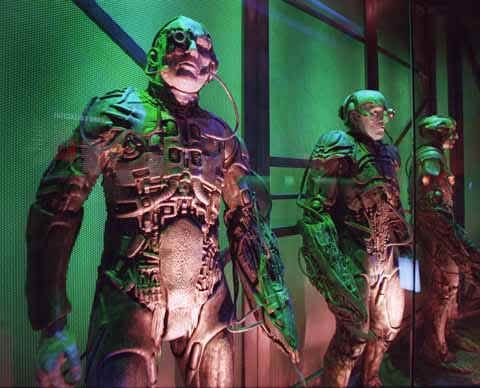
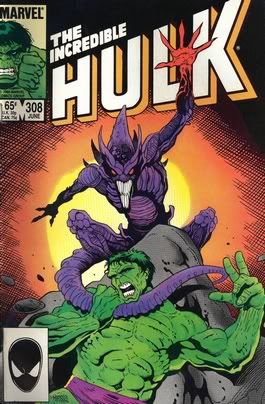 I've been steadily shaving away my floppy collection for a few years. I'm moving in May and I figure it's time to finally get rid of the whole thing. I also have a bunch of Magic: The Gathering cards I don't use anymore, and some Marvel Vs. cards I've never used.
I've been steadily shaving away my floppy collection for a few years. I'm moving in May and I figure it's time to finally get rid of the whole thing. I also have a bunch of Magic: The Gathering cards I don't use anymore, and some Marvel Vs. cards I've never used.